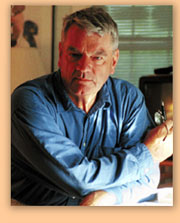 David Irving[Photoby Michael Hentz, forThe New York Times] Letter to the Editor of |
| The Sunday Telegraph The Letters Editor 1 Canada Square Canary Wharf London E14 5AR |
London, October 19, 1997
Sir,As has now been proven by Ian Mitchell in The Cost of a Reputation , key files of the wartime Foreign and War Offices which upheld Tolstoy's historical arguments were withdrawn from public scrutiny at the PRO on dates between 1987 and 1989 and not replaced until the trial was over - the FO not restoring the most crucial item, FO.1020/42, to the public domain until November 1991. By that time Tolstoy had lost the action (in November 1989), being ordered to pay 2m damages and costs to the plaintiff, and had seen his appeals founder too.
| I might add that my own experience was very different. In 1969, when I was forced
to defend the libel action brought by Captain J E Broome, DSO, RN, against my publishers
and myself (Broome v Cassell & Co Ltd.,
which now enlivens every law student's curriculum) the Admiralty disclosed many still-secret
records equally and without favour to both myself and the plaintiff's lawyers, including
even the products of signals Intelligence. (The "ultra" secret was not finally made public until 1974). Historians are already at the mercy of government departments which arbitrarily decide which records shall be released and which retained ad infinitum (among the latter: wartime FO files on Japan, and the transcripts of Rudolf Hess's conversations and of Winston Churchill's wartime telephone consultations with Franklin Roosevelt). It is quite wrong that when a writer like Tolstoy succeeds in painstakingly filling in the gaps from other sources, he should be at the mercy of a fickle old boys' network - whether it be of Masons or ministers, Old Wykehamists or Conservative Party officials or whatever - which conspires to hound him and his family to ruination. In the Tolstoy case there was a lynching, a demonstrable interference with the course of justice, and there must be a criminal inquiry into who abetted it. The PRO keeps the most excellent computerised records of all who draw upon its resources, so it should not take too long to get to the bottom of this scandalous affair. It must not be that the guilty parties, without a murmur of embarrassment or regret, merely shrug their shoulders, close ranks, cover their tracks, and get away with it. Yours faithfully, |